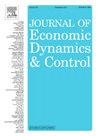Social learning for the masses
IF 1.9
3区 经济学
Q2 ECONOMICS
引用次数: 0
Abstract
I consider a plausible role for social learning as implemented in the work of Jasmina Arifovic in a complex macroeconomic environment. The model is DSGE with considerable heterogeneity, enough to approach Gini coefficients for income, wealth, and consumption in the U.S. data. The economy has an ambient stochastic structure, and I consider transition dynamics following exceptionally large shocks like the global financial crisis or the global pandemic. These shocks are large enough to plausibly perturb the economy out of the rational expectations equilibrium associated with more ordinary shocks. How is equilibrium re-established? I argue that a social learning construct may be more appropriate in this environment, as opposed to the econometric learning constructs often used to analyze departures from rational expectations in the literature. I also argue that a “DNA” feature of social learning may have led to relatively fast convergence to rational expectations observed following these large shocks in the U.S. data.
面向群众的社会学习
我认为在复杂的宏观经济环境中,社会学习在Jasmina Arifovic的工作中发挥了合理的作用。该模型是具有相当异质性的DSGE,足以接近美国数据中收入、财富和消费的基尼系数。经济具有环境随机结构,我考虑的是全球金融危机或全球流行病等特大冲击之后的过渡动态。这些冲击大到足以扰乱经济,使其脱离与更普通冲击相关的理性预期均衡。如何重新建立平衡?我认为,在这种环境下,社会学习结构可能更合适,而不是经常用于分析文献中偏离理性预期的计量经济学学习结构。我还认为,社会学习的“DNA”特征可能导致了在美国数据中观察到的这些大冲击之后相对较快地趋同于理性预期。
本文章由计算机程序翻译,如有差异,请以英文原文为准。
求助全文
约1分钟内获得全文
求助全文
来源期刊

Journal of Economic Dynamics & Control
ECONOMICS-
CiteScore
3.10
自引率
10.50%
发文量
199
期刊介绍:
The journal provides an outlet for publication of research concerning all theoretical and empirical aspects of economic dynamics and control as well as the development and use of computational methods in economics and finance. Contributions regarding computational methods may include, but are not restricted to, artificial intelligence, databases, decision support systems, genetic algorithms, modelling languages, neural networks, numerical algorithms for optimization, control and equilibria, parallel computing and qualitative reasoning.
 求助内容:
求助内容: 应助结果提醒方式:
应助结果提醒方式:


